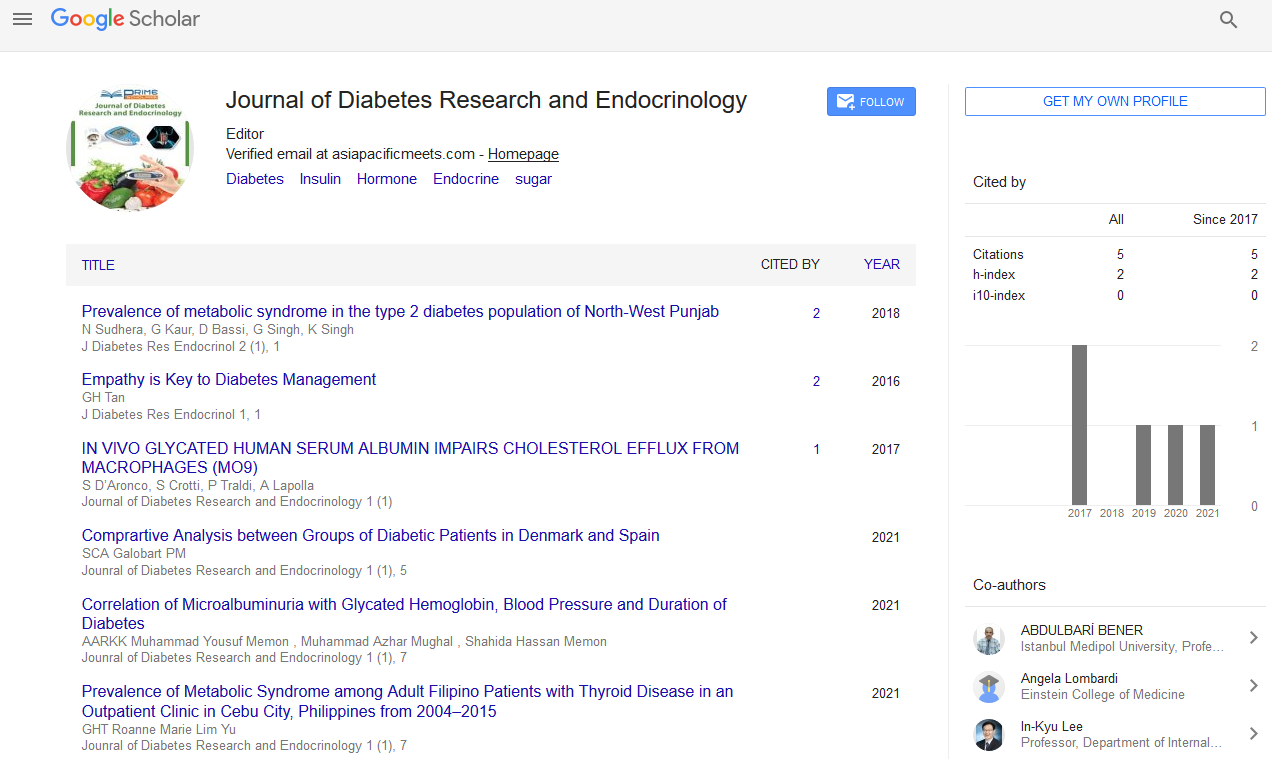Opinion - (2024) Volume 8, Issue 1
Cardiovascular Risk Management in Diabetes
Ella Green*
Department of Endocrinology, Chichester University, UK
*Correspondence:
Ella Green,
Department of Endocrinology, Chichester University,
UK,
Email:
Received: 28-Feb-2024, Manuscript No. IPJDRE-24-20065;
Editor assigned: 01-Mar-2024, Pre QC No. IPJDRE-24-20065 (PQ);
Reviewed: 15-Mar-2024, QC No. IPJDRE-24-20065;
Revised: 20-Mar-2024, Manuscript No. IPJDRE-24-20065 (R);
Published:
27-Mar-2024, DOI: 10.36648/ipjdre.08.01.09
Introduction
Cardiovascular disease (CVD) is the leading cause of morbidity
and mortality among individuals with diabetes mellitus. The
interplay between diabetes and cardiovascular risk necessitates
comprehensive management strategies to reduce the incidence
of heart attacks, strokes, and other cardiovascular complications.
This article explores the critical aspects of cardiovascular risk
management in diabetes, highlighting effective approaches to
improve patient outcomes. Diabetes mellitus, particularly type
2 diabetes (T2D), significantly increases the risk of developing
cardiovascular diseases. Chronic hyperglycaemia, insulin
resistance, and associated metabolic abnormalities contribute
to the development of atherosclerosis, hypertension, and
dyslipidaemia, all of which are major risk factors for CVD.
Additionally, diabetes can lead to microvascular damage
that affects the heart’s blood vessels, further compounding
cardiovascular risk. Maintaining optimal blood glucose levels is
fundamental in reducing cardiovascular risk. Regular monitoring
of HbA1c levels helps in assessing long-term glycaemic control
and adjusting treatment strategies accordingly. Hypertension is
a common comorbidity in diabetes and a major cardiovascular
risk factor. Regular monitoring and control of blood pressure
are essential. The American Diabetes Association (ADA)
recommends maintaining blood pressure below 140/90 mmHg,
or below 130/80 mmHg for some individuals. Dyslipidaemia,
characterized by elevated LDL cholesterol, low HDL cholesterol,
and high triglycerides, is prevalent in diabetes. Regular
lipid profile assessments are crucial for early detection and
management. Tools like the Framingham Risk Score or the
ASCVD Risk Calculator can help estimate an individual’s 10-year
risk of developing cardiovascular disease, guiding the intensity
of preventive measures.
Description
Adopting a diet rich in fruits, vegetables, whole grains, lean
proteins, and healthy fats is vital. The Mediterranean diet, known
for its cardio protective benefits, is highly recommended. Limiting
the intake of these fats can help lower LDL cholesterol levels
and reduce cardiovascular risk. Engaging in at least 150 minutes
of moderate-intensity aerobic activity per week, combined
with muscle-strengthening exercises, improves cardiovascular
health and glycaemic control. Weight loss, even modest, can
significantly reduce cardiovascular risk by improving blood
pressure, lipid levels, and insulin sensitivity. These medications
are preferred for managing hypertension in diabetes due to
their Reno protective and cardio protective effects. These are
also effective options for blood pressure control. Statins are the
cornerstone of dyslipidaemia management in diabetes. They
reduce LDL cholesterol levels and have been shown to lower
the risk of cardiovascular events. These can be added to statin
therapy for individuals who require additional lipid-lowering.
Low-dose aspirin is recommended for secondary prevention
in individuals with diabetes who have a history of CVD. Its
role in primary prevention should be individualized based on
cardiovascular risk and bleeding risk.
Conclusion
Continuous monitoring and follow-up with healthcare providers ensure that risk factors are managed effectively and treatment plans are adjusted as needed. Cardiovascular risk management in diabetes requires a multifaceted approach that includes regular monitoring, lifestyle modifications, and appropriate pharmacological interventions. By addressing glycaemic control, blood pressure, lipid levels, and lifestyle factors, healthcare providers can significantly reduce the cardiovascular burden in individuals with diabetes. Through comprehensive and personalized care, it is possible to improve cardiovascular outcomes and enhance the overall quality of life for those living with diabetes. Cardiovascular risk management in diabetes involves comprehensive strategies including regular monitoring of blood glucose, blood pressure, and lipid levels. Key interventions include lifestyle modifications such as a heart-healthy diet, regular exercise, and weight management, along with appropriate use of antihypertensive, lipid-lowering, and glucose-lowering medications to reduce cardiovascular complications.
Citation: Green E (2024) Cardiovascular Risk Management in Diabetes. J Diab Res Endocrinol. 8:09.
Copyright: © 2024 Green E. This is an open-access article distributed under the terms of the Creative Commons Attribution License, which permits unrestricted use, distribution, and reproduction in any medium, provided the original author and source are credited.

